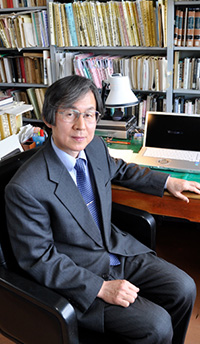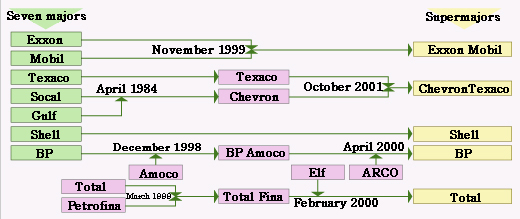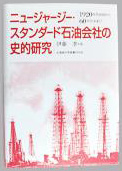
Exxon Corporation (an American major petroleum firm; Exxon Mobil Corporation since 1999) became the largest petroleum firm in the United States and the world in a relatively short period of time after the petroleum industry was created in the middle of the nineteenth century. To this day, for far over a century, the firm has maintained that position. The firm has no parallel in other major industries. I have been following the firm’s history as a topic of my research in economics since the latter half of the 1970s.
Another characteristic of the firm is that it established its subsidiaries in the United Kingdom and other countries as early as the end of the nineteenth century. In the 1930s, Exxon reached a point where more business activities—including crude oil production and product sales—were conducted in foreign countries than in the firm’s home country, the United States. Therefore, Exxon can be considered a pioneer for today’s global firms.
My persistent interest in this firm stems from my curiosity to know major firms that are central players in today’s economic activities. Because many of the major firms today are global firms, I think that description of global firms is indeed one of the most important issues in current research on major firms. Research on the long history of Exxon provides important hints for providing an answer to the following question: What is today’s major firm?
1. Purpose of research and methodology: Describing the contemporary capitalist economy with a focus on major firms
I studied classic works to find guiding principles: Finance Capital by Rudolf Hilferding (1910) and Imperialism, the Highest Stage of Capitalism by Vladimir Lenin (1917). I decided that the purpose of my research would be to describe the contemporary capitalist economy, and that my research would mainly focus on the activities of major firms.
2. Narrowing down the research focus: Examining the global firm as the typical form of today’s major firm
I acquired a historical overview of the overseas expansion of American firms by reading Mira Wilkins’ works, The Emergence of Multinational Enterprise (1970) and The Maturing of Multinational Enterprise (1974). At the same time, I studied the history of the formation of American capitalism and explored characteristics specific to American firms rather than European firms in terms of overseas expansion.
3. Research topic chosen: Conducting historical research on Exxon Corporation, an international petroleum firm
I examined, in historical order, the activities of Exxon Corporation (Standard Oil Company〔New Jersey〕until 1972) which was one of the largest firms in the world among all industries and represents today’s global firms. In 2004, after much work, I finally published a book, A History of Standard Oil Company〔New Jersey〕:An Inquiry into its Worldwide Business Activity,1920-1969.
4. New research: Describing the current state of Exxon Corporation
I described Exxon’s (Exxon Mobil’s) crude oil production conducted from the early 1990s to the early 2000s. This was a shift from historical research to contemporary research. I thought that it was necessary as a historical researcher to, at some point, study contemporary issues, and that doing so would make it possible to reconfirm the significance of historical research.
5. Return to historical research: Describing Exxon Corporation in the 1970s
The world’s petroleum industries went through historical changes in the 1970s. That decade showed discontinuity with the 1960s. Part of the structure and characteristics of today’s petroleum industry emerged in the 1970s. Currently, I am elucidating Exxon’s various activities in the 1970s, including crude oil production and product sales, and exploring how the prototype of the firm’s activities observed today was formed during that period.
One of my research topics has been the sources of the strengths and advantages of Exxon, which has been a predominant presence as a capitalist firm. In my view, attributing the firm’s strengths and advantages to its prompt responses to changes at different points in time does not completely reflect the reality. I think that many of the firm’s actions have been quite cautious, and that the steady actions, which could sometimes be considered conservative, have continued since the 19th century to this day.
Marking a contrast with Exxon’s status as the largest petroleum firm in the United States, the firm did not produce crude oil at all until around the end of the 1880s. Discovery of an oil field quite often occurs by chance, and while a successful discovery leads to an enormous amount of wealth, a failure can result in a total loss. The founders of the firm, including John D. Rockefeller, initially thought that the crude oil production business was too risky to enter. Nevertheless, the firm devised a unique mechanism with which it put under its control almost all the production of crude oil in the United States. This point should attract much attention.
Another behavioral tradition that was inherited by Exxon Corporation was bold decisions and the ability to execute them in times of crisis. Exxon lost almost half of its subsidiaries in 1911 after being found in violation of the Antitrust Act and gradually lost ground in competition with other firms in the 1920s. However, during the difficult period following the Great Depression that started in 1929, the firm made significant investments domestically and overseas against the odds and succeeded in turning the negative situation around all at once. This is one example of bold actions taken by the firm when facing a crisis.
Karl Marx, the author of Das Kapital, characterized capital as self-expanding value. He also said that capital works without limit. Equipped with a mixture of steadiness and boldness, Exxon Corporation has expanded its operations over a long period of time and seems, to me, to typify the concept of capital as described by Marx.

Process leading to the birth of the supermajors

Oil field development today (source: Petroleum Development Technology Guidebook (in Japanese) by the Japan Petroleum Development Association)
Professor, Graduate School of Humanities and Social Sciences

A History of Standard Oil Company〔New Jersey〕:An Inquiry into its Worldwide Business Activity,1920-1969(in Japanese). Sapporo: Hokkaido University Press, 2004.


© Copyright Saitama University, All Rights Reserved.